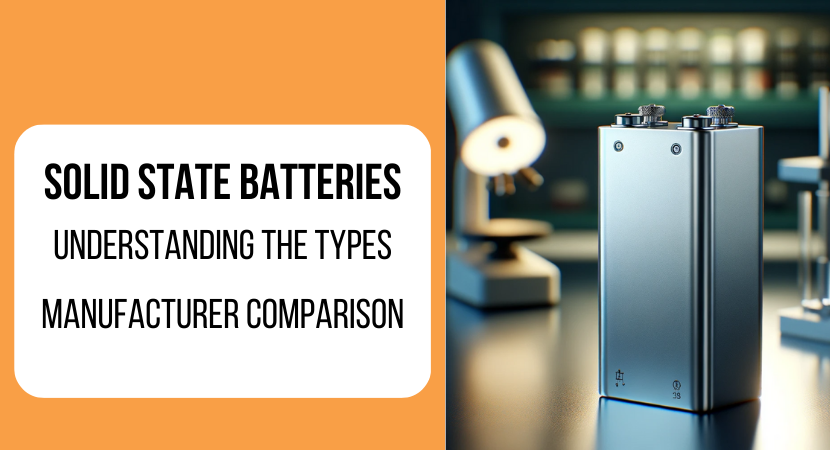目次
What is a Solid State Battery?
An all-solid-state battery is a battery that uses solid electrolytes instead of the liquid electrolytes of a conventional battery.Batteries using conventional liquid electrolytes have problems such as the risk of short circuits and fires due to leakage, short life spans, and fixed shapes.
However, all-solid-state batteries reduce these risks and provide an efficient energy supply.
On the other hand, if you do not choose the right product for your application, there is a risk that costs will increase and product development will fail.
When promoting your project, it is important to consider the industrial standards and connect with reliable companies when selecting and adopting all-solid-state batteries for the products you are developing.
In order to successfully select an all-solid-state battery, in this article we will introduce the types of all-solid-state batteries, how to choose them, and three reliable manufacturers to help you choose the most suitable option for your business.
Two Types of Solid-State Batteries

Bulk All-Solid-State Battery
- Ionic conduction through direct contact between solid electrolyte and electrode materials
- High capacity and simplified manufacturing process
- Ideal for large storage batteries in electric vehicles (EVs) and green energy applications
Thin-Film All-Solid-State Battery
- Utilizes a thin solid electrolyte layer
- Compact, lightweight design with energy density twice that of traditional lithium batteries
- Suitable for wearable devices, offering ultra-fast charging capabilities
What is the difference between Bulk Solid State and Thin Film Solid State?
When comparing bulk solid state batteries with traditional thin-film all-solid-state batteries, we notice the following differences- Bulk Solid State batteries offer high capacities and are simple to manufacture
- The contact area between the electrode and electrolyte is large, making it possible to create batteries with high energy density
- The manufacturing process is simple and costs can be reduced by about 30% compared to thin-film all-solid-state batteries
- Bulk structure has more stable properties while avoiding the risks of using liquid electrolytes
- Its flexibility makes it especially suitable for large storage batteries for electric vehicles (EVs) and green energy, and will play a major role in promoting carbon neutrality
Thin-film all-solid-state batteries on the other hand, offer a wide range of benefits such as
- Ultra-thin electrolyte layer allows for compact and lightweight battery designs
- Thin electrolyte layer enables charging more than 10 times faster than lithium batteries
- It is possible to manufacture bendable batteries for wearable devices such as smart watches and rings
Four Types of Solid-State Battery Electrolytes
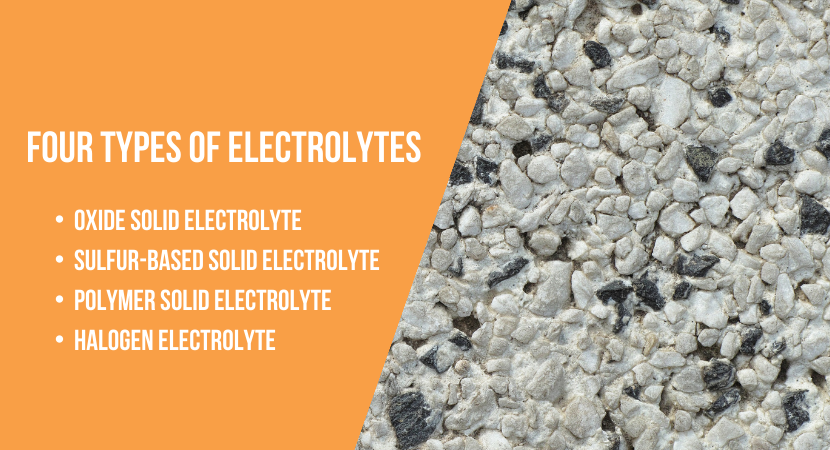
1.Oxide Solid Electrolyte
Oxide solid electrolytes are made from ceramic materials, typically oxides of lithium. They are known for their high ionic conductivity and stability, making them suitable for high-energy-density batteries.It can be used in EVs, plug-in hybrid vehicles, smartphones, and laptops.
2.Sulfur-Based Solid Electrolyte
Sulfur-based solid electrolytes, often incorporating lithium sulfide (Li2S), are a newer class of solid electrolytes. They offer a promising pathway for high-capacity battery systems.This type of electrolyte is commonly used in EVs, outdoor equipment, and storage batteries in low-temperature settings.
3.Polymer Solid Electrolyte
Polymer solid electrolytes are made from polymer matrices (like polyethylene oxide) that contain lithium salts. They are flexible and can be manufactured in thin films.This battery type is suitabke for bendable and foldable devices, wearable technology, and compact electronic products.
4.Halogen Electrolyte
Halogen solid electrolytes are less common and are a more experimental area in solid-state electrolytes. They would involve halogen elements (like fluorine, chlorine) in their structure.However, halogen electolytes do struggle with oxidative deterioration affecting cycle life.
Advantages and Disadvantages of All-Solid-State Batteries
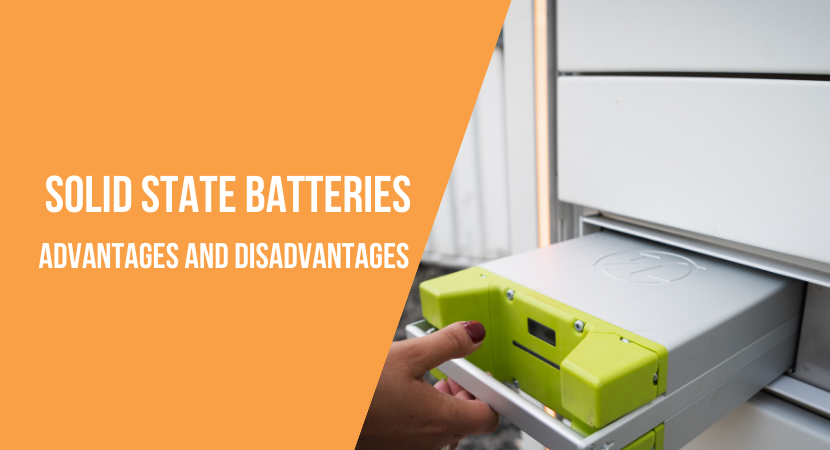
Now that we are familiar with the types of solid state batteries as well as their electrolytes, we can know dig deeper into the the advantages and disadvantages that these technologies have to offer.
Depending on the industry and application of your solid state batteries, your choice may vary greatly.
Let us try to understand these concepts better in the following paragraphs.
Solid State Battery Advantages
- Wide Operating Temperature Range: Operates from -30°C to over 100°C, making it suitable for diverse environments
- High Safety: Eliminates risks associated with liquid electrolytes, ensuring stability in various conditions
- High Degree of Freedom in Shape and Size: Enables compact and lightweight designs, ideal for various applications
Solid State Battery Disadvantages
- High Cost: Expensive due to the use of specialized materials and complex manufacturing processes
- Low Ionic Conductivity: Slower charging speeds compared to liquid batteries, with room for improvement
7 Steps to choose an All-Solid-State Battery
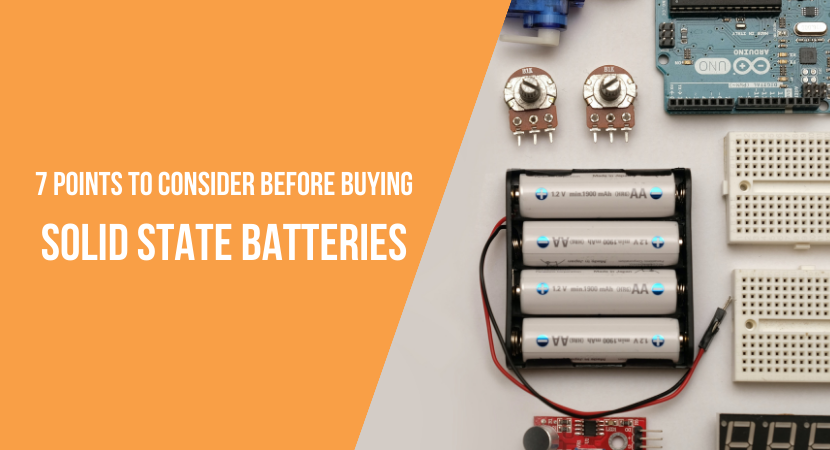
If you would like to choose the best solid state battery for your needs, it is important to go over the main factors or steps you should consider.
Let us take a look at the 7 steps to choose an All Solid State Battery.
- Energy Density: Balance between capacity and size
- Current Capacity: Consider charging and discharging needs
- Battery Size: Choose based on application, whether large for EVs or small for portable devices
- Charging Speed: Assess the importance of fast charging
- Cycle Life: Balance between lifespan and cost
- Price: Align with budget constraints
- Safety: Choose manufacturers with stringent safety standards
Now, let us explore these topics further so that we may have a better understanding of how solid state batteries work and how they can vary depending on your individual needs.
Energy Density
Energy density refers to the amount of electricity that can be absorbed and carried in the same volume.For example, if a 300Wh and 150Wh all-solid-state battery is installed in a 10W device, the 300Wh battery can be used for 30 hours, and the 150Wh battery can be used for about 15 hours.
Higher energy density is an advantage when considering long-term use, but higher energy density also increases the risk of damage and short circuits.
You need to choose one with an energy density appropriate for your application.
Current Capacity
All-solid-state batteries with a large current capacity can be charged quickly and used at high output, making them ideal for machines that charge and discharge large amounts of electricity in a short period of time, such as electric vehicles.However, depending on the application, the current capacity does not necessarily need to be large.
Battery Size
All-solid-state batteries can be large enough to be used as a car battery, or small enough to fit into a smartwatch. It is necessary to use a different one depending on the purpose, but the larger the battery size, the larger the current capacity tends to be.Solid-state batteries in smartwatches don’t need to be as large as those in electric cars.
Charging Speed
Some people believe that batteries that can be charged faster are better. This is not however, true for all cases.Depending on the application, a slow charging speed may not be an issue, and costs can be further reduced.
Cycle Life
The difference in cycle life of solid-state batteries can be more than 10 times greater, and some can last for more than 10 years.However, the installation cost increases accordingly, so it is necessary to balance the cycle life and price of all-solid-state batteries .
Price
All-solid-state batteries have a wide price range, with some available for over 30,000 yen/kWh and others for around 10,000 yen/kWh.While more expensive materials often have higher energy efficiency, density, and durability, they don’t need to be expensive for some applications .
Safety
Safety and stability are important for solid-state batteries.Since there is a possibility that product defects or accidents may occur due to purchased all-solid-state batteries, it is important to choose a company that has strict standards for manufacturing processes, material selection, quality control, etc.
Manufacturers conduct the following tests to ensure the safety and useability of solid-state batteries.
- Overcharge Test
- Over Discharge Test
- Short Circuit Test
- Thermal Shock Test
- Temperature Cycle Test
- Overheating Test
- Crushing Test
In particular, tests from overcharge tests to temperature cycle tests are tests to confirm minimum safety and performance.
Some companies conduct overheating tests, crushing tests, etc. to emphasize higher reliability and performance.
Standards for safety and material selection are often not posted online, so you will need to check with your sales representative.
These are the points you should definitely compare when selecting an all-solid-state battery.
Based on these seven points, we will now move forward and introduce a few recommended manufacturers that manufacture all-solid-state batteries.
If you are looking for a manufacturer that produces all-solid-state batteries that are perfect for your business, please read on.
Top Four All-Solid-State Battery Manufacturers
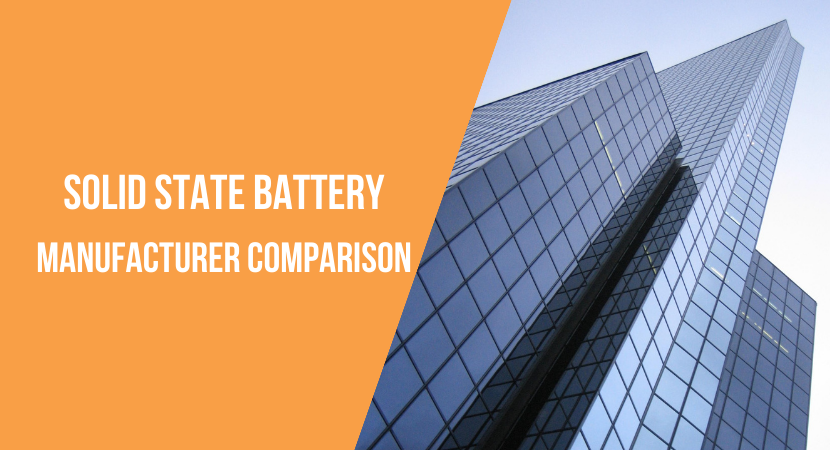
In this section, we will introduce four carefully selected companies and compare their solid-state batteries, each with its strengths.
| Maxell Corporation | Toyota Motor Corporation Co., Ltd. |
Nippon Electric Glass | Resonac (Hitachi Chemical) |
|
|---|---|---|---|---|
| Oxide type All-solid-state battery |
× | × | ✓ | ✓ |
| Sulfide type All-solid-state battery |
✓ | × | × | × |
| Polymer-based All-solid-state battery |
× | × | × | ✓ |
| Halogen type All-solid-state battery |
× | ✓ | × | × |
1.Maxell Co., Ltd.
Maxell, Ltd.is a part of Hitachi’s Dry Cell Battery Division.The accumulation of technology in fields such as dry batteries, lithium batteries, and alkaline batteries has led to the current research and development of all-solid-state batteries.
Some of these most notable points about this manufacturer are
- Focus on oxide-based and sulfur-based solid electrolytes.
- Emphasis on small devices and wearables.
- Mass production set to begin in summer 2023. Maxell has accumulated battery technology over many years and has very strict quality control standards.
Toyota Motor Corporation
Toyota Motor Corporation is a major Japanese automobile manufacturer and one of the leading companies in the global automobile industry.Some of the most stand out features for this company include
- Investing in all-solid-state battery technology for electric vehicles
- Aiming for advancements in safety, energy density, and high-speed charging
- Leveraging global network for development
Toyota Motor Corporation is strengthening its efforts to popularize electric vehicles and address environmental issues by advancing research and development of all-solid-state battery technology.
Resonac [Hitachi Chemical]
Resonac (Hitachi Chemical) is putting particular effort into reducing the manufacturing costs of polymer-based solid-state batteries.They have reduced manufacturing costs by developing unique electrolyte technology.Some of the most prominent features for this company include
- Development of all-solid-state batteries using polymer electrolytes
- Invested in Ionic Materials, a materials venture for solid-state batteries, to advance the development of polymer-based solid-state batteries
- Resonac is also developing oxide-based all-solid-state batteries, aiming to achieve both the low cost advantages of polymer-based all-solid-state batteries and the energy density of oxide-based all-solid-state batteries
Resonac’s all-solid-state batteries have the potential to be used in a wide range of applications, from products that require energy density such as electric vehicles and storage batteries to small electronic products such as smartphones and wearable devices.
Nippon Electric Glass
Nippon Electric Glass is particularly focused on all-crystalline glass technology, pursuing improvements in safety and energy density .Nippon Electric Glass’ all-solid-state batteries are expected to be installed in a variety of devices such as electric cars and smartphones.
It excels in the following fields
- Development of all-solid-state batteries using oxide electrolytes
- In addition to using oxide all-solid sodium ions for the electrolyte, crystallized glass is used for the positive and negative electrodes
- The sodium ion conductivity of crystallized glass is higher than that of liquid electrolyte, aiming to achieve both safety and energy density
Although it is still in the research and development stage, it is expected to be installed in products that require light weight and high energy density, such as electric vehicles and smartphones.
Navigating the landscape of all-solid-state batteries involves understanding types, electrolytes, advantages, and considerations.
Selecting a reliable manufacturer aligns your project with cutting-edge technology, ensuring a seamless transition to this revolutionary energy storage solution.
Purchasing your own Solid State Battery
At JET Global, we are committed to helping you find the best machine that suits your business needs.If you have any questions regarding any of the topics mentioned in today’s article, please feel free to reach out to us via our Contact Page.
Our team of specialists would be happy to help with your questions.
Contact Us Today

